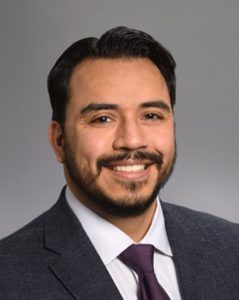Exam Curiosity Inspired Him to Become Volunteer
By Rodney Campbell, ABR Communications Manager
2024;17(4):10

When he was a fellow at the University of Texas MD Anderson Cancer Center in Houston, there was one thing that Richard Castillo, PhD, wanted to avoid: senior colleagues randomly testing his knowledge in hallways or break rooms.
“I would walk by the wrong person, and they would say, ‘Oh, hey, Richard, what’s this or that?’” he said. “And I would answer, ‘Ah, I don’t know.’ Then I would want to run the other way.”
Dr. Castillo survived the ordeal and earned his initial certification in therapeutic medical physics eight years ago. Now, he finds himself on the question-asking side. Dr. Castillo, who is being promoted to professor at Emory University’s School of Medicine on September 1, will serve as an ABR medical physics oral examiner for the third time this fall.
Curiosity about how initial certification exams are put together led him to apply to become a volunteer.
“The exam process was very much a black box for people,” said Dr. Castillo, who’s also director of the certificate program in medical physics in Emory’s Department of Radiation Oncology. “I wanted to learn more about it and be able to contribute to it in whatever way I could, as an advocate and in service to others who were going through it.”
Dr. Castillo teaches trainees who are preparing for the certification exam. His experiences at MD Anderson and as an ABR volunteer have made him aware of their understandable hesitancy about taking oral exams.
“They have a fear of looking silly and not knowing the answers,” he said. “I’ve tried to leverage that experience and that insight into how I teach and make it about developing a rapport.”
Dr. Castillo believes being empathetic and patient as an oral examiner is key to ensuring a fair process for candidates. After all, he and the other volunteer examiners were once on the other side.
“I try to put myself back there and, more than anything, try to meet that person where they are,” Dr. Castillo said. “They’re nervous. It’s high stress, high pressure. I understand candidates may blank on something that they know just because of the environment and what’s happening.”
Among the myths he wants to dispel is that oral examiners are trying to trick candidates and fail them. Dr. Castillo said that, on the contrary, they want to discover what examinees know and ensure they can be part of a competent patient care team.
“I know how much this means to them,” he said. “I’ve gone through it, and I want to do my part to make the process better. It’s an interesting thing being an oral examiner because you want the people to pass so badly, but you can’t speak for them.”
Dr. Castillo also volunteers for the American Association of Physicists in Medicine (AAPM), where he serves as vice chair of the Equity, Diversity, and Inclusion Committee, chair of the Diversity and Inclusion Subcommittee, and founding chair of the Hispanic and Latin-X Medical Physics Subcommittee. (The ABR has a DEI committee that includes members of the boards of governors and trustees.)
He brings that experience into his ABR volunteer duties by seeking ways to ensure that exams remain fair and relevant for all candidates.
“I’m highly motivated to pursue that type of inquiry,” said Dr. Castillo, who was named a fellow of the AAPM in July. “In the meantime, I want to keep doing what I’m doing, which is serve the ABR, our trainees, and examinees in the best way that I can.”
ABR Associate Executive Director for Medical Physics Geoffrey Ibbott, PhD, was a professor and chair of the department of radiation physics at MD Anderson when Dr. Castillo was there. He was impressed by his young colleague, who had 20 publications and several grants, including a prestigious K01 award from the National Cancer Institute that goes to early career-stage researchers in cancer control and prevention.
Dr. Ibbott suspects that Dr. Castillo wasn’t caught off-guard very often when facing a pop quiz.
“Richard needn’t have been concerned,” Dr. Ibbott said. “He was an outstanding student, postdoc, and faculty member at MD Anderson, and I remember him as always being very well prepared for meetings, presentations, and even his annual reviews. He took on his responsibilities with enthusiasm.”


